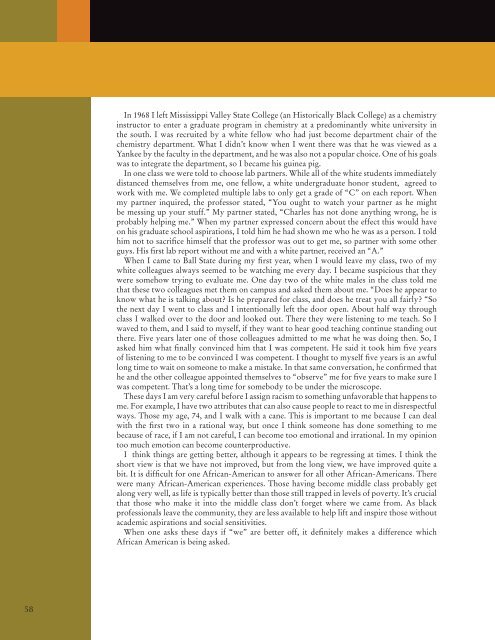FacingRacismLR
You also want an ePaper? Increase the reach of your titles
YUMPU automatically turns print PDFs into web optimized ePapers that Google loves.
58<br />
In 1968 I left Mississippi Valley State College (an Historically Black College) as a chemistry<br />
instructor to enter a graduate program in chemistry at a predominantly white university in<br />
the south. I was recruited by a white fellow who had just become department chair of the<br />
chemistry department. What I didn’t know when I went there was that he was viewed as a<br />
Yankee by the faculty in the department, and he was also not a popular choice. One of his goals<br />
was to integrate the department, so I became his guinea pig.<br />
In one class we were told to choose lab partners. While all of the white students immediately<br />
distanced themselves from me, one fellow, a white undergraduate honor student, agreed to<br />
work with me. We completed multiple labs to only get a grade of “C” on each report. When<br />
my partner inquired, the professor stated, “You ought to watch your partner as he might<br />
be messing up your stuff.” My partner stated, “Charles has not done anything wrong, he is<br />
probably helping me.” When my partner expressed concern about the effect this would have<br />
on his graduate school aspirations, I told him he had shown me who he was as a person. I told<br />
him not to sacrifice himself that the professor was out to get me, so partner with some other<br />
guys. His first lab report without me and with a white partner, received an “A.”<br />
When I came to Ball State during my first year, when I would leave my class, two of my<br />
white colleagues always seemed to be watching me every day. I became suspicious that they<br />
were somehow trying to evaluate me. One day two of the white males in the class told me<br />
that these two colleagues met them on campus and asked them about me. “Does he appear to<br />
know what he is talking about? Is he prepared for class, and does he treat you all fairly? “So<br />
the next day I went to class and I intentionally left the door open. About half way through<br />
class I walked over to the door and looked out. There they were listening to me teach. So I<br />
waved to them, and I said to myself, if they want to hear good teaching continue standing out<br />
there. Five years later one of those colleagues admitted to me what he was doing then. So, I<br />
asked him what finally convinced him that I was competent. He said it took him five years<br />
of listening to me to be convinced I was competent. I thought to myself five years is an awful<br />
long time to wait on someone to make a mistake. In that same conversation, he confirmed that<br />
he and the other colleague appointed themselves to “observe” me for five years to make sure I<br />
was competent. That’s a long time for somebody to be under the microscope.<br />
These days I am very careful before I assign racism to something unfavorable that happens to<br />
me. For example, I have two attributes that can also cause people to react to me in disrespectful<br />
ways. Those my age, 74, and I walk with a cane. This is important to me because I can deal<br />
with the first two in a rational way, but once I think someone has done something to me<br />
because of race, if I am not careful, I can become too emotional and irrational. In my opinion<br />
too much emotion can become counterproductive.<br />
I think things are getting better, although it appears to be regressing at times. I think the<br />
short view is that we have not improved, but from the long view, we have improved quite a<br />
bit. It is difficult for one African-American to answer for all other African-Americans. There<br />
were many African-American experiences. Those having become middle class probably get<br />
along very well, as life is typically better than those still trapped in levels of poverty. It’s crucial<br />
that those who make it into the middle class don’t forget where we came from. As black<br />
professionals leave the community, they are less available to help lift and inspire those without<br />
academic aspirations and social sensitivities.<br />
When one asks these days if “we” are better off, it definitely makes a difference which<br />
African American is being asked.


